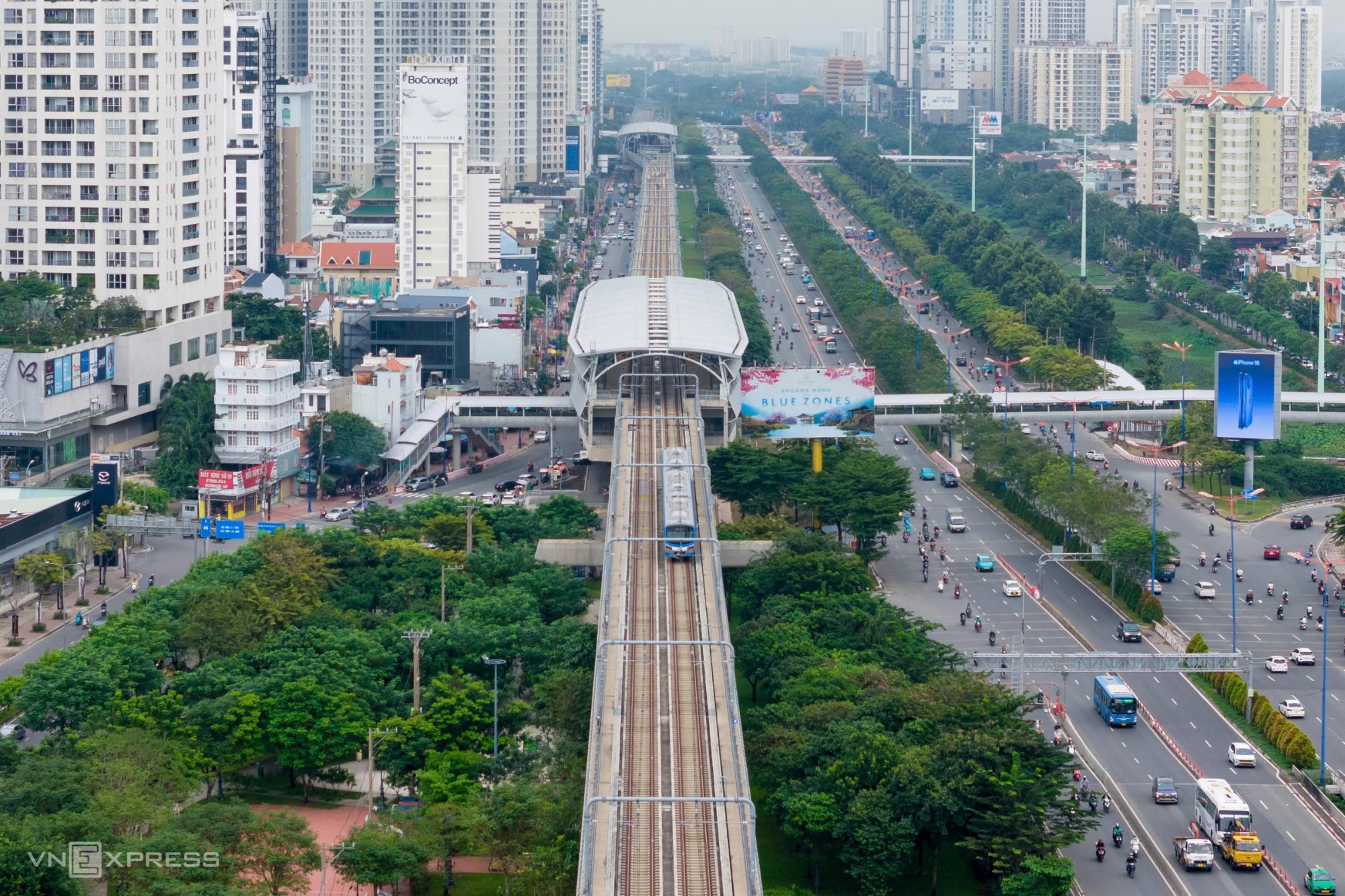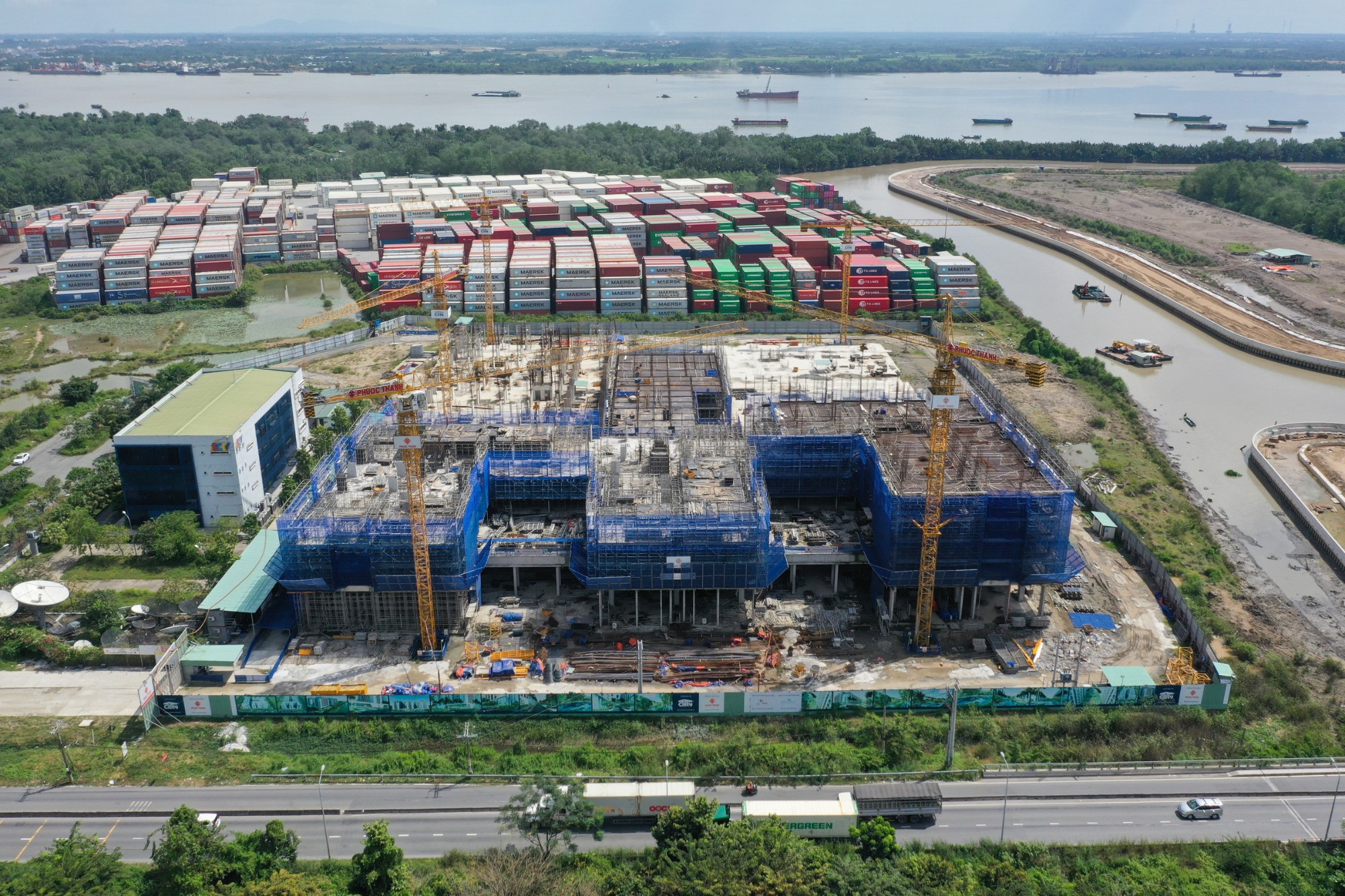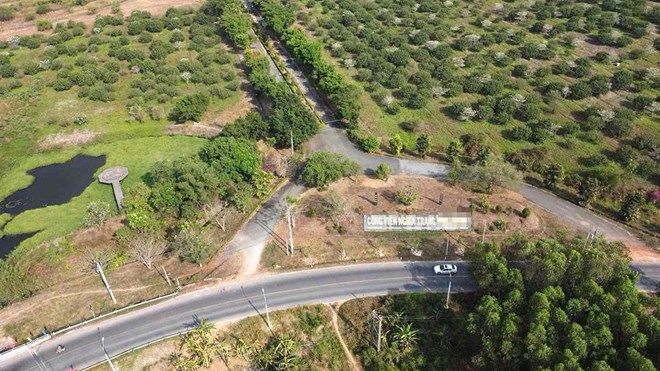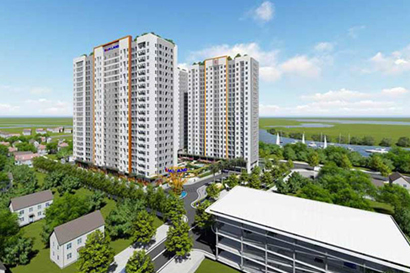
Investing in Apartments Near the Bến Thành - Suối Tiên Metro Line
Many investors are looking to buy or hold onto apartments near the metro line, but experts caution that "not every project in these areas will appreciate in value."
Thanh Tâm (from District 10, Ho Chi Minh City) has some idle capital and is looking to invest in an apartment to wait for price increases. However, apartments in the Thu Duc area are already priced quite high, and with limited funds, she chose to invest in a newly upcoming project in the first quarter, located in Di An, near the Suoi Tien metro station (the new Eastern Bus Station). This project is being marketed as located on the metro line that connects Ho Chi Minh City to Binh Duong, tapping into the future metro potential, with prices expected to be around 2.3 billion VND for a two-bedroom unit.
Similarly, Mr. Binh, an investor from Thu Duc, has also placed a reservation for an apartment in a project marketed as being developed according to the TOD (Transit-Oriented Development) model, near the Binh Thai metro station. In 2021, this project was launched with a price of only 52 million VND per square meter, but it was not well-received due to its distance from the city center. Now, with the metro operating, the developer has capitalized on the increased interest, announcing a new selling price nearly 40% higher than it was four years ago.
"I bought it as an investment, hoping that prices along the metro line will continue to rise in the coming years," Mr. Binh shared.
Not only are investors buying new properties, but many are also holding onto their current real estate, believing that prices will continue to increase. Bich Hanh (from District 3) decided to keep her apartment near the Phuoc Long station, despite being offered a 15% markup compared to the price she paid at the beginning of 2023. According to Hanh, there is little available land around this area, and new projects are priced high, so there is a good chance the value will continue to increase. "Many real estate agents inquire about buying the apartment, but few homeowners are willing to sell right now. Most want to hold on and wait for the price to rise further," Hanh said.

Many apartment buildings are rising along both sides of Metro Line 1 Bến Thành - Suối Tiên, December 2024 Photo: Quỳnh Trần.
According to research data from the Batdongsan portal, in the second half of 2024, many projects along Metro Line 1 saw a 10-60% increase in purchase interest, especially in the final months of the year when the metro is about to begin operation. The highest demand growth occurred in projects that are under construction or about to be launched, such as Eaton Park (Thu Duc City) with a 22-fold increase, Lumiere Riverside doubling, and The Gió Riverside (located in Di An, near metro station S2.1 extending towards Binh Duong) seeing a 3-fold increase.
According to a report from CBRE Vietnam, in 2024, the secondary market prices of apartments along the metro line increased by 15% compared to the same period last year. Over the past 8 years (since 2015), the average price of apartments near this infrastructure has increased by 50-70%, with some projects rising up to 150%. DKRA Group also reported that in 2024, the secondary market prices of apartments in projects along the metro line increased by 10-25% compared to the end of 2023, reflecting the benefits of transportation infrastructure.
According to VnExpress, within a 2-7 km radius from the Ben Thanh-Suoi Tien metro line, nearly 80 apartment projects have been or are being launched. Among these, projects around An Phu and Thao Dien stations are mostly secondary projects, while areas around Suoi Tien station (New Eastern Bus Station), Thu Duc station, and Binh Thai station are focused on new supply with more affordable prices.
Most of the upcoming projects near Suoi Tien, Binh Thai stations, and the metro extension to Binh Duong are running marketing campaigns emphasizing their proximity to the metro, capitalizing on the popularity and the tendency of homebuyers to invest based on infrastructure. In addition, developers are also benefiting from the "metro effect," selling these properties with new prices, increasing by an average of 10-20% compared to previous projects in the same area.
However, not all projects near the metro are experiencing increased demand and price hikes. According to Batdongsan's survey of 60 projects, 23 projects saw a decrease in interest by 5-20%, and some experienced a 30-80% drop in demand. These projects are mostly ones with incomplete legal procedures, no land-use rights certificates (red books), slow construction progress, or issues in implementation. Correspondingly, 12 projects saw no price growth as expected, with prices dropping by 3-9%, and in some cases, even more than 30% compared to 2023.
Regarding the potential of real estate around the metro line, Mr. Vo Huynh Tuan Kiet, Director of CBRE's housing market, stated that the trend of investing in real estate based on infrastructure is not new. The expansion of metro lines and ring roads will continue to stimulate the real estate market in Thu Duc City and surrounding satellite urban areas, making them more vibrant and active. Many new projects are being launched with a new price level higher than before.
However, investing based on infrastructure is a long-term game, requiring capital, and not all investors will succeed. Metro projects typically take years to complete, so expecting rapid price increases in the short term is difficult and not recommended.
Before investing, investors need to consider various factors such as checking the zoning of areas where metro lines pass, including the specific locations of stations, routes, and construction progress. Additionally, the project's legal status must be carefully examined to ensure it has transparent legal procedures and completed paperwork, such as construction permits and land-use rights certificates.
In agreement, Mr. Dinh Minh Tuan, Director of Batdongsan in the Southern region, emphasized that not every area near the metro line has price-increasing potential. If an area is near the metro but lacks convenient connections to other important transport hubs, it may not only struggle to increase in value but could even decrease in price. Property value will only rise in areas with synchronized development, including the formation of urban areas and residential communities with full services and amenities such as markets, hospitals, schools, and parks. These are essential factors that investors must carefully consider to ensure that their infrastructure-based investment strategy delivers the best results.
Mr. Tuan suggests focusing on projects within a 2-3 km radius from the metro stations. Some projects further away, but with good transport connections or links to future metro lines, may also be worth considering. However, investors should still be cautious about legal issues and delivery schedules. Additionally, it is recommended to compare the prices of properties near the metro with nearby areas to determine whether they accurately reflect the real value, avoiding buying in a hot market phase where the potential could be limited, and the risk is higher.
According to the leader of a real estate company in Ho Chi Minh City, the recent price surge in properties along the metro, besides reflecting actual value increases, also includes cases of "riding the wave." Some projects near metro stations have been reported to cause noise pollution, but prices still increased by 50-60%, which seems illogical and may indicate inflated prices.
Additionally, this person also pointed out that the demand for homes and price increases around the metro are influenced by psychology. The first-time operation of the metro creates a sense of excitement and drives interest and discussion. Once the metro system becomes more common and other lines are completed, this enthusiasm may subside, and the "metro-driven" price surge could end.
vnexpress.net

















